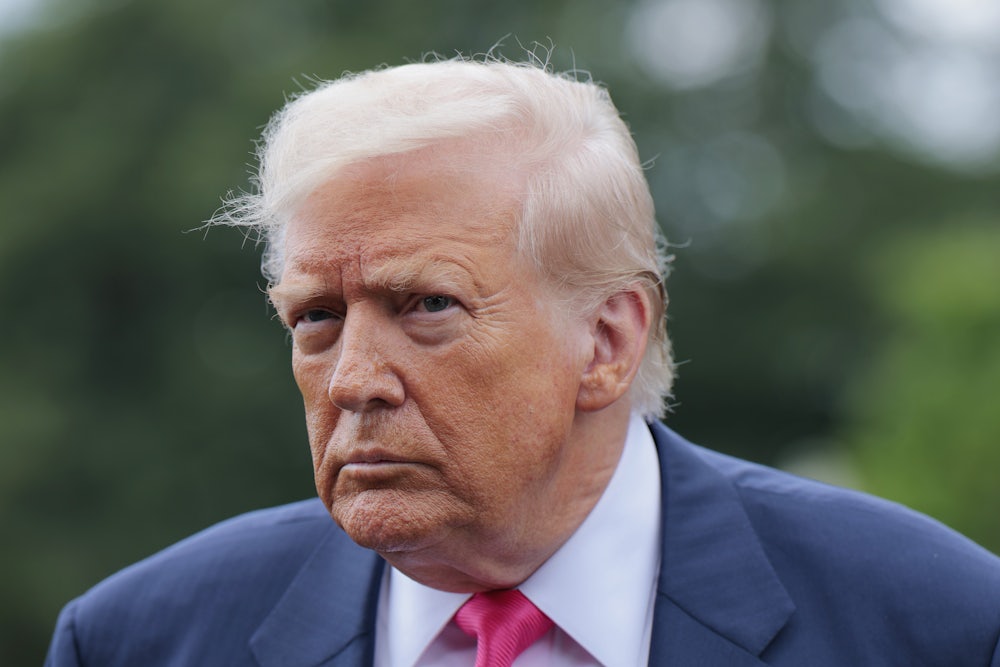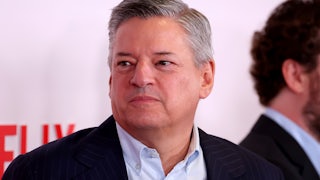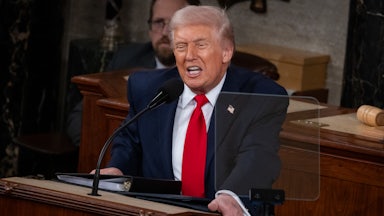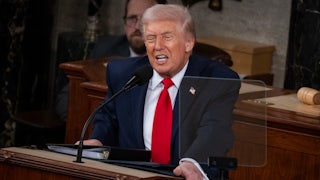Is President Donald Trump in serious trouble? It’s much too soon to know, but he is struggling to an unusual degree to contain the fallout from the Justice Department’s announcement earlier this month that sought to dispel many of the popular beliefs about Jeffrey Epstein, the deceased infamous financier who faced child sex-trafficking charges. Federal investigators asserted that there was no evidence that Epstein blackmailed powerful figures, kept a “client list,” or died by a means other than suicide when he was found dead in his cell in New York City in 2019.
The announcement prompted a wave of internal and external fury among Trump’s supporters, for whom the Epstein case had taken on a totemic significance. Attorney General Pam Bondi, who held a media event in March where aides hoisted large binders that read “Epstein Files” and claimed that new information would soon come to light, received the lion’s share of the blame. FBI Director Kash Patel also came under fire after insisting on Twitter that the Epstein-related “conspiracy theories just aren’t true, never have been.” His top deputy, Dan Bongino, reportedly considered resigning in protest.
In a post on Wednesday, Trump insisted that the fallout—which, again, came largely from his own supporters and boosters in right-wing media—was actually a scheme by Democrats to distract from how good of a job he’s doing as president. “Their new SCAM is what we will forever call the Jeffrey Epstein Hoax, and my PAST supporters have bought into this ‘bullshit,’ hook, line, and sinker,” he wrote on Truth Social, his personal social-media service. “They haven’t learned their lesson, and probably never will, even after being conned by the Lunatic Left for 8 long years.”
It’s a bizarre statement even by Trump’s own standards. Epstein is arguably one of the most famous American criminal defendants of the twenty-first century. After years of rumors and reports, he was finally hit with federal sex-trafficking charges in July 2019—during Trump’s first term, no less—and held at a federal detention center in Manhattan, where he died by suicide in August before his trial could begin. Trump’s habit of referring to any damaging information as a “hoax” has never been more laughable or concerning than it is here.
No one can honestly hope in 2025 that this or any other political scandal will seriously damage Trump, who has escaped multiple scandals—from rape allegations to the Access Hollywood tape to a felony conviction for paying off an adult film star—that would have ended anyone else’s political career over the past decade. At the same time, it is striking how poorly his usual playbook will work for the Epstein files debacle.
For one thing, Trump cannot simply lean into it. Toward the end of his first term, his favored tactic was to implicitly acknowledge the basic facts but insist he had done nothing wrong. When he faced impeachment for coercing the Ukrainian government to smear his eventual 2020 opponent Joe Biden, for example, Trump frequently insisted his actions were innocent and that the infamous phone call where he pressured Ukrainian President Volodymyr Zelensky was a “perfect phone call.”
During his second impeachment trial, he claimed that his exhortations to the insurrectionary crowd on January 6 were peaceful critiques of what he saw as a stolen election, as well as constitutionally protected free speech. That approach also worked well enough for what Trump derisively called “process crimes” like obstruction of justice or conspiracy after he left office; it is somewhat less tenable when the matter at hand is underage sex trafficking.
Trump also cannot credibly claim that he is the victim of some kind of “witch hunt,” even though he is trying to do so. This line of attack worked well enough when he had tangible adversaries on the other side of the equation: Special counsel Robert Mueller for the Russia investigation, the Manhattan district attorney’s office for his financial cases, Georgia prosecutor Fani Willis for the election fraud case, special counsel Jack Smith for the January 6 case and the Mar-a-Lago classified documents case, or even the House and Senate Democrats who investigated him.
Trump pummeled them relentlessly for their alleged bias and hostility, discrediting them among his supporters and allies and insulating himself from any political fallout from the investigations’ findings. Those days are over now; there are no more witch-hunters. Trump’s executive orders destroyed the post-Watergate tradition of independence at the Justice Department and the FBI, and his appointees have pursued and ousted any employees who are deemed insufficiently loyal to the president’s agenda. Both chambers of Congress are also under Republican control, depriving Democrats of a means to subpoena Trump or even hold hearings about his actions. This scandal is entirely a self-inflicted wound.
The president may have thought that the next four years would be free of the investigations and “hoaxes” that marked the last eight years. That would explain why he appears to be even more frustrated than usual about this new scandal. “Are you still talking about Jeffrey Epstein?” he recently told a reporter when asked about him. “This guy’s been talked about for years. Are people still talking about this creep? That is unbelievable. Do you want to waste this time? I can’t believe you’re asking about Epstein.”
Part of the problem is that the optics are terrible. It is indisputable that Trump knew both Epstein and Ghislaine Maxwell, the latter of whom received a 20-year prison sentence for her role in Epstein’s crimes. There are countless photos of them together at public events over a number of years. Particularly damaging for Trump is that he seems to have remarked upon Epstein’s personal life, so to speak, well before it became public knowledge.
In 2002, New York magazine published a profile of the secretive financier titled “Jeffrey Epstein: International Man of Mystery.” It noted that his financial clients were largely unknown, as was the nature and structure of his business. Maxwell made a cameo as what one source described as a “soulmate,” hinting at their mysterious relationship without really scratching the surface of it.
Perhaps the only person interviewed for the article who actually seemed to know much about Epstein was Trump, and his comments are eye-opening given what we now know about Epstein’s activities. “I’ve known Jeff for fifteen years. Terrific guy,” he told the magazine. “He’s a lot of fun to be with. It is even said that he likes beautiful women as much as I do, and many of them are on the younger side. No doubt about it — Jeffrey enjoys his social life.”
By 2019, his tune had changed. A reporter asked him at a White House photo op if he had ever banned Epstein from Mar-a-Lago. “Yes, and I did have a falling out a long time ago,” Trump replied. “The reason doesn’t make any difference, frankly. But I haven’t spoken to him in probably 15 years or more. I wasn’t a big fan of Jeffrey Epstein, that I can tell you.” The exact nature or timing of this “falling out” is unclear. Whatever the reason, Trump is hardly eager to draw attention to their former friendship these days.
Most importantly, the scandal threatens to puncture one of the central mythologies that Trump supporters have built around him since he began his political career. One of the MAGA movement’s most influential subcultures holds that its opponents—top Democratic politicians, major media figures, left-wing billionaires and celebrities, and so on—are secretly members of some kind of pedophilic cabal. When top Clinton advisor John Podesta’s emails were hacked and released in 2016, for example, far-right figures seized on mundane emails about pizza orders and claimed that they represented some kind of secret code for child sex trafficking.
“Pizzagate,” as the theory became known, never quite became a mainstream tenet of MAGA ideology at the time. Trump himself appears to have never mentioned it, Fox News anchors did not embrace it, and top Republicans were baffled by it. (An exception was Michael Flynn, an avowed conspiracy theorist who briefly served as Trump’s national security advisor.) But it continued to fester in right-wing social-media spaces until a North Carolina man burst into a Washington, D.C. pizza shop with an automatic rifle and demanded the children be freed. None were found.
After Trump took office, the conspiracy theory that his opponents were secret pedophiles metamorphosed into something else. An anonymous poster on 4chan, a notorious far-right website, claimed that he was a top-level government official with “Q clearance.” There are three basic traits to what became known as the QAnon conspiracy theory: First, there is a secret Satanic cabal of pedophiles engaged in a global sex-trafficking scheme who run the government; second, Trump is part of a secret organization working to root out the cabal; and third, Trump will someday expose the pedophiles in a day known as “the Storm” and bring them to justice.
The conspiracy theory had proto-fascistic elements that foreshadowed Trumpism’s future: In some versions of “the Storm,” top Democrats and liberals would be summarily and publicly executed, for example. At the time, QAnon offered a soothing counter-narrative to Trump’s tumultuous first term for his supporters. The incompetence and scandal that they saw on TV and in the newspapers was just a smokescreen, its adherents believed. Everything that looked bad for Trump could be chalked up as a distraction from his real efforts to eradicate the so-called deep state.
A curious detail is that Trump has, as far as I can tell, never really tried to validate these theories. He has never repeated any of the pedophilia allegations, either against specific opponents or in general terms about his adversaries. When asked about QAnon in a 2020 interview, he professed ignorance. “I do know that they are very much against pedophilia,” he said. “They fight it very hard, but I know nothing about it.” Trump has never shied away from attacking his opponents in bitter, personal, and even false terms. But even he has never gone that far.
This may be the first Trump scandal that actually feels like a scandal for some of Trump’s supporters—not because they think he actually played any role in the underage sex trafficking or that he silenced Epstein in some way in 2019, but because it effectively dispels a mythology that they had constructed to justify supporting him no matter what. Trump is not, in fact, a clandestine crusader who is heroically working to take down a deep-state pedophile ring that wants to destroy him first. He’s just another politician looking to get out of a jam.






